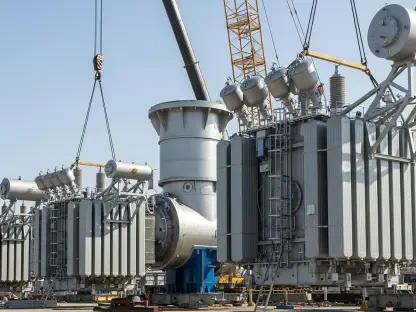Imagine a nation at the crossroads of energy reform, where regulatory oversight suddenly tightens, shaking the foundations of an industry critical to economic growth. In Mexico, the newly established National Energy Commission (CNE) has taken a bold step by suspending 35 permits in the electricity and hydrocarbon sectors due to non-compliance. This decisive action raises pressing questions about the balance between regulation and operational stability in one of Latin America’s largest energy markets. What does this mean for companies, investors, and the broader landscape of energy production? This report delves into the implications of these suspensions and their ripple effects across the industry.
Overview of Mexico’s Energy Sector
Mexico’s energy sector stands as a cornerstone of the national economy, contributing significantly to GDP through robust electricity and hydrocarbon industries. The country ranks among the top oil producers in the region, with state-owned PEMEX playing a dominant role alongside private players in exploration and production. Meanwhile, the electricity market has seen growing participation from renewable energy firms, driven by reforms aimed at liberalizing the sector and encouraging competition.
The industry’s importance cannot be overstated, as it supports industrial growth, job creation, and energy security for millions of citizens. Key players include international giants and local firms, operating under a complex framework of regulations that govern everything from exploration to distribution. The scale of operations is vast, with thousands of permits issued for projects ranging from oil storage terminals to solar power plants.
At the heart of this ecosystem is the National Energy Commission (CNE), tasked with ensuring compliance and fostering a fair, transparent market. Established to replace previous regulatory bodies, the CNE holds sweeping authority to issue permits, monitor adherence to legal standards, and penalize violations. Its role is pivotal in shaping the direction of energy policies and maintaining the sector’s integrity amid rapid transformation.
Details of Permit Suspensions by CNE
Reasons for Non-Compliance
The CNE’s recent suspension of 35 permits stems from a range of violations that highlight systemic gaps in adherence to regulatory mandates. Common issues include non-payment of annual supervision fees, failure to initiate operations within stipulated timelines, and neglect of mandatory requirements such as securing insurance. These breaches reflect not just individual lapses but broader challenges in meeting stringent legal obligations.
Specific cases paint a clearer picture of the infractions. For instance, Almacenes Distribuidores de la Frontera lost nine storage terminal permits in the hydrocarbon sector for failing to maintain required insurance coverage. Similarly, Gas Plus had a permit revoked due to unpaid fees spanning several years, while Armax Renewable Energies in the electricity sector faced cancellation for accumulating unpaid dues over an extended period. These examples underscore the diversity of non-compliance issues affecting various industry segments.
The spread of violations across both hydrocarbon and electricity sectors suggests deeper, structural problems within the industry. Financial delinquency often compounds operational delays, as companies struggle to meet both fiscal and project milestones. This pattern of non-compliance indicates a need for stronger internal governance among permit holders to align with regulatory expectations.
Scope and Impact of Suspensions
The suspension of 35 permits represents a significant enforcement action, affecting multiple companies across different facets of the energy sector. From storage terminals to power generation projects, the breadth of these cancellations signals a comprehensive crackdown on non-compliance. The scale of this move has sent shockwaves through the industry, prompting a reevaluation of operational strategies among affected firms.
For the companies directly impacted, the immediate consequences are severe, including halted operations and potential financial losses. Projects that never commenced, alongside those failing to meet fiscal duties, now face uncertainty, with some firms risking permanent exclusion from the market. This disruption not only affects their revenue streams but also their credibility with stakeholders and partners.
Beyond individual companies, these suspensions carry broader implications for investor confidence and industry dynamics. The stringent measures may deter new entrants wary of regulatory risks, while existing players might reassess their commitments in the short term. Such actions, though aimed at accountability, could inadvertently slow the momentum of energy sector growth if not balanced with supportive policies.
Challenges Facing the Energy Sector
The energy sector in Mexico grapples with a host of operational and financial hurdles that contribute to non-compliance with CNE regulations. Many companies face cash flow constraints, making it difficult to pay supervision fees or invest in necessary infrastructure. These financial pressures often lead to delays in project execution, further compounding the risk of permit revocation.
Additionally, bureaucratic inefficiencies exacerbate the situation, creating bottlenecks that hinder timely compliance. The transition to the CNE’s oversight has introduced uncertainties, with companies struggling to navigate evolving procedural requirements. Delays in permit processing and unclear guidelines have left many firms ill-prepared to meet deadlines or fulfill obligations.
Addressing these challenges requires proactive strategies from industry players. Strengthening financial planning, investing in compliance training, and engaging with regulators for clearer directives are essential steps. Without such measures, the risk of future suspensions looms large, potentially undermining the sector’s stability and growth prospects.
Regulatory Landscape and CNE’s Role
Mexico’s energy sector operates under a robust legal framework, primarily governed by the Hydrocarbons Law (LH) and the Electric Industry Law (LIE). These statutes set stringent standards for operational, financial, and safety requirements, ensuring that companies contribute to a sustainable and secure energy market. Compliance with these laws is non-negotiable for permit holders seeking to operate within the country.
The CNE has adopted a firm enforcement approach, as evidenced by the recent suspensions, signaling a zero-tolerance policy toward violations. This stance aims to elevate compliance standards but also places significant pressure on companies to align with regulatory demands swiftly. The commission’s actions are a clear message that accountability is paramount, regardless of a firm’s size or sector.
However, the CNE itself faces early operational challenges, including procedural delays that have impacted its efficiency. A notable hiatus in sessions earlier this year led to a backlog of filings, creating uncertainty for permit applicants and holders alike. Resolving this backlog and streamlining processes will be critical for the commission to maintain credibility and support the industry’s regulatory needs effectively.
Future Outlook for Mexico’s Energy Sector
Looking ahead, the CNE’s regulatory actions are likely to have lasting effects on Mexico’s energy landscape. Stricter enforcement could foster a culture of accountability, pushing companies to prioritize compliance and operational excellence. However, if not managed carefully, such measures might also discourage investment by creating perceptions of an overly punitive environment.
The commission’s ability to address its backlog and refine permitting processes will play a pivotal role in shaping energy reform policies. Efficient handling of administrative tasks could restore confidence among stakeholders, paving the way for smoother project approvals and renewals. This, in turn, would support the sector’s growth trajectory over the coming years.
Emerging trends point toward increased scrutiny and the need for streamlined bureaucratic mechanisms as key determinants of future stability. Companies will likely face greater pressure to adapt to regulatory expectations, while policymakers may need to balance enforcement with incentives for innovation. These dynamics will define the sector’s evolution in the long term.
Conclusion and Recommendations
Reflecting on the events surrounding the suspension of 35 permits, it becomes evident that Mexico’s energy sector stands at a critical juncture. The CNE’s actions underscore a commitment to regulatory integrity, yet they also expose underlying financial and operational weaknesses among companies. The early struggles of the commission with procedural delays add another layer of complexity to an already challenging environment.
Moving forward, stakeholders must prioritize actionable solutions to prevent similar disruptions. Companies should invest in robust compliance frameworks and maintain open dialogue with regulators to clarify expectations. Policymakers, on the other hand, ought to consider support mechanisms, such as extended timelines or financial assistance, to ease the burden on struggling firms.
Ultimately, fostering a stable energy environment in Mexico will require collaboration between the CNE, industry players, and government bodies. By addressing bureaucratic inefficiencies and promoting transparency, all parties can work toward a future where regulation strengthens rather than stifles growth. This collective effort holds the key to unlocking the full potential of the nation’s energy ambitions.









